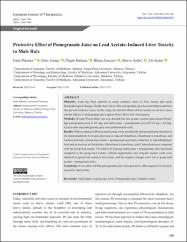Protective effect of pomegranate juice on lead acetate-induced liver toxicity in male rats

View/
Access
info:eu-repo/semantics/openAccessAttribution-NonCommercial 3.0 United Stateshttp://creativecommons.org/licenses/by-nc/3.0/us/Date
2023Metadata
Show full item recordAbstract
Objective: Lead has been reported to cause oxidative stress in liver tissues and cause histopathological changes. Studies have shown that pomegranate juice has antioxidant properties that prevent oxidative stress. In this study, the harmful effects of lead acetate on rat liver tissue and the efficacy of pomegranate juice against these effects were investigated. Methods: 28 male Wistar albino rats were divided into four groups: control, lead acetate (50 mL/ kg), pomegranate juice (1 mL/kg), and lead acetate + pomegranate juice (50 mL/kg+1 mL/kg). Lead acetate and pomegranate juice were administered orally. Results: When compared with the control group, it was seen that the lead acetate had an increase in the malondialdehyde level and a decrease in reduced Glutathione, Glutathione S-transferase, and Carboxylesterases. Group lead acetate + pomegranate juice had a reduction in malondialdehyde level and an increase in Glutathione, Glutathione S-transferase, and Carboxylesterases compared with the group lead acetate. The lead level of group lead acetate + pomegranate juice decreased compared to the group lead acetate. Cellular degeneration and irregular hepatic cords were observed in group lead acetate's liver tissue, and the negative changes were lost in group lead acetate + pomegranate juice. Conclusion: It was observed that pomegranate juice had a protective effect against liver toxicity caused by lead acetate.
Source
European Journal of TherapeuticsVolume
30Issue
2Collections
The following license files are associated with this item:


















